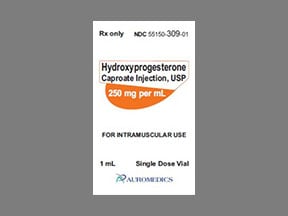
Makena Coupons & Savings Card – Discount Prices from $151.17
Brand for: Hydroxyprogesterone
My prescription
Edit
1ML of 250MG/ML, Hydroxyprogesterone (1 Vial)
Select pharmacy

Walgreens
$151.17
COUPON PRICE
Albertsons
$161.07
COUPON PRICEMakena savings card
Show this card to your pharmacist
Walgreens
$151.17
BIN
ID
PCN
GRP
019876
LH4BDBF790
CHIPPO
LHX
Powered by
More prescriptions for uterine cancer
More prescriptions for uterine cancer
Makena (Hydroxyprogesterone) dosage forms
Dosage Quantity Price from Per unit 1ML of 250MG/ML 1 Vial $151.83 $151.83 1ML of 250MG/ML 2 Vials $294.66 $147.33 1ML of 250MG/ML 3 Vials $437.49 $145.83
| Dosage | Quantity | Price from | Per unit |
|---|---|---|---|
| 1ML of 250MG/ML | 1 Vial | $151.83 | $151.83 |
| 1ML of 250MG/ML | 2 Vials | $294.66 | $147.33 |
| 1ML of 250MG/ML | 3 Vials | $437.49 | $145.83 |
What is the drug Makena used for?
Makena is used to help reduce the risk of preterm birth in women who are pregnant with a single baby and have a history of spontaneous preterm birth. It is a form of progesterone, a hormone that plays a key role in maintaining pregnancy.
Why was Makena taken off the market?
Makena was taken off the market because the U.S. Food and Drug Administration (FDA) determined that the drug was not effective in reducing the risk of preterm birth. Despite initial approval based on early studies, subsequent research did not confirm its efficacy. As a result, the FDA recommended its withdrawal to ensure that patients receive treatments that are both safe and effective.
Is Makena no longer FDA approved?
Yes, Makena is no longer FDA approved. The U.S. Food and Drug Administration (FDA) withdrew its approval for Makena, a drug intended to reduce the risk of preterm birth, due to concerns about its effectiveness.
What is the Makena shot used for?
The Makena shot is used to help reduce the risk of preterm birth in women who are pregnant with a single baby and have a history of spontaneous preterm birth.
Can you still get Makena?
As of October 2023, Makena, a drug used to reduce the risk of preterm birth, is no longer available in the United States. The FDA withdrew its approval due to concerns about its effectiveness. Patients should consult their healthcare providers for alternative treatments or options.
